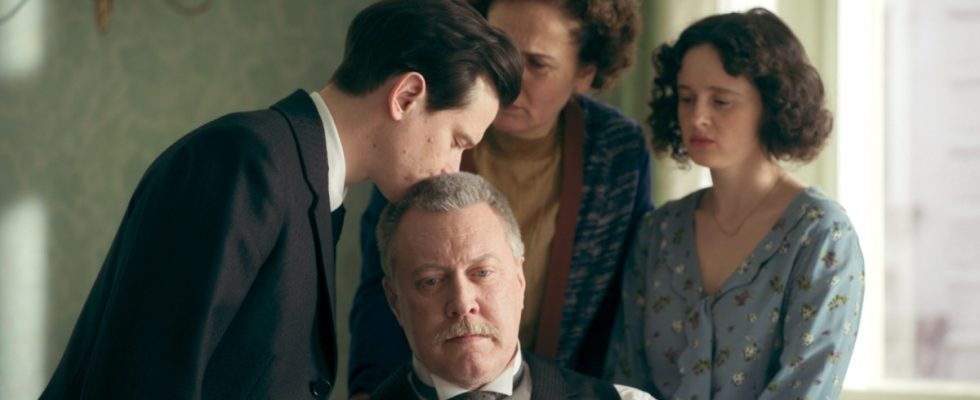How does he do that? Everyone else is creating and doing and making art; a world author like Daniel Kehlmann, the biographer Reiner Stach, who you can probably call any date and he knows off the top of his head what Franz Kafka was up to on this or that day, and of course David Schalko, the director of something so brilliant how “Braunschlag” was already touched upon by infallibility. But then appears Nicholaus Ofczarek, smacks his lips, gobbles down, even eats, and says as father Herrmann Kafka with a disgusted sideways glance at the child who is grumbling about nuts: “I can’t watch it – how a Has!!!” The depiction of desperate, yet nuanced comedy is also a small reversal in the Kafka legend, because one feels pity for the old man. And thinks to himself, yes, that’s it, the moment that will remain from this super series about the life of Franz Kafka. The 100 handwritten pages of his never-sent accusation, “Letter to the Father,” condensed into a single Ofczarek scene.
How the Austrian can achieve such miracles – perhaps you’ll get a little insight into him and let him take a look at his art workshop on April 17th in the Munich Künstlerhaus. There, Ofczarek and his wife, the actress Tamara Metelka, read the text of someone who, like Kafka, lived through a childhood drama in Prague and also had a notorious unwillingness to commit to anything: Rainer Maria Rilke. The selection of work by both of them is special. The prose poem “The Way of Love and Death by Cornet Christoph Rilke” is somehow forgotten today, but it was a million-seller, his best-selling publication, both during his lifetime and after his death. It is said that the narrow island volume, published in 1912, was in the knapsacks of countless soldiers. A cult book from the generation that initially went into the world wars euphorically and then died in the trenches.
Reading from Rilke’s “The Way of Love and Death by Cornet Christoph Rilke”: Tamara Metelka and Nicholaus Ofczarek. The violinist Nikolai Tunkowitsch (center), who, among other things, composes music for the Burgtheater, has created haunting music for this.
(Photo: Ingo Pertramer)
“Ride, ride, ride, through the day, through the night, through the day. Ride, ride, ride,” says the “Cornet.” In brief, impressionistic scenes, Rilke tells of an 18-year-old who fights against the Turks as a standard-bearer in the imperial Austrian army at the end of the 17th century and dies. His end is disturbing, an inner monologue that ends with a strange image: “But when it crashes behind him, they are gardens again, and the sixteen round sabers that jump towards him, ray after ray, are a celebration. A laughing water art.”
The genre term “knapsack literature” actually exists. Anti-war books about the “universal soldier” such as Grimmelshausen’s “Simplicissimus” or Remarque’s “Nothing New in the West” come to mind, but also controversial ones such as Ernst Jünger’s “In Stahlgewittern” or open war propaganda in the style of “Der Landser” dime magazines. Rilke’s “Cornet” was also held up as a transfiguration of soldiering. Wrongly, Nicholaus Ofczarek is deeply convinced of this, and explains to the SZ: “If you have read and understood the text, I cannot understand how you can describe this work as transfiguring war. Rather, it is deeply pacifist literature , which questions the ‘honor’ of going to war until the bitter end.”
Anti-war reading – it’s hard to imagine that soldiers on the fronts still look for distraction or support in literature today. What is it then, Tiktok videos, sports? Nicholaus Ofczarek: “I think that in order to exist in a war zone, you have to be deeply separated from yourself. Distraction in any form seems welcome.”
Great vocal artists and human actors such as the declared pacifist Oskar Werner have performed the “Cornet”. A Burgtheater hero like Ofczarek. Tamara Metelka was also part of the ensemble at the Vienna House (1994 to 2005), and today the actress is also a professor of speech formation at the Max Reinhardt Seminar. “Our only means is language. And the musicality inherent in it,” says Nicholaus Ofczarek, whose parents were both opera singers, about the art of performance. “The interpretation takes place in the listener’s head. The work itself is in the foreground. And rightly so.”
Nicholas Ofczarek and Tamara Metelka: The Way of Love and Death by Cornet Christoph Rilke as a musical reading, Sunday, April 14th, 11 a.m., Munich Artists’ HouseLenbachplatz 8

